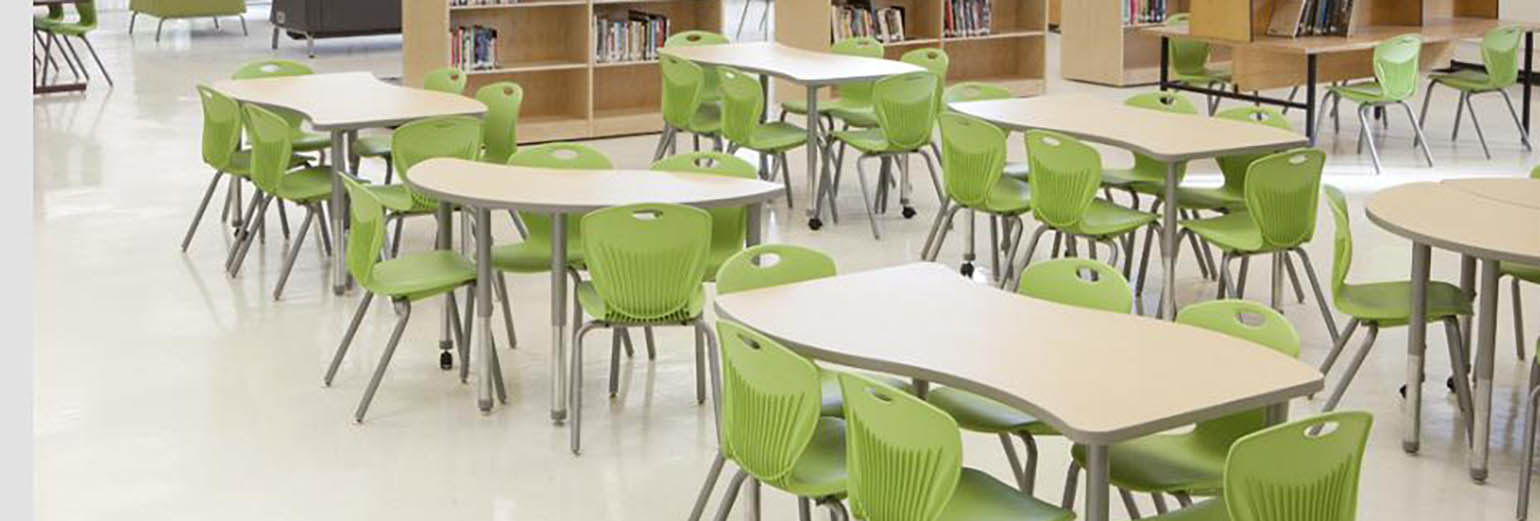Close your eyes and picture the school libraries you spent time in as a youth. Chances are they all looked pretty similar: Rows of thick wooden shelving piled high with books. Students sitting quietly at tables, reading independently or perhaps working together in hushed tones.
The school library was a place you came to check out books, or look up information in encyclopedias or other reference materials as you compiled a research report. Younger students would have story time, and older students might use the library for studying.
But that’s changing. Mobile devices and wireless broadband have given students limitless access to information in the palm of their hands. With a world of information now just a click away, the teacher’s role is no longer just to impart information but to have students co-construct new knowledge—often in collaboration with each other. Learning is becoming more active and engaging, with students in charge of their own learning.
As teaching and learning have shifted in these fundamental ways, school libraries are transforming as well. Consider these examples:
- At Cushing Academy in Ashburnham, Mass., where all students use laptop computers for learning, the school has transitioned to a “bookless library.” A database with millions of digital texts replaced its 20,000-volume collection of books, and a café replaced the circulation desk. Instead of being a quiet place for students to study individually, the library is now a vibrant hub for digital learning and conversation.
- Chicago’s Francis W. Parker School has redesigned its traditional library—with its cubicles and stacks that hindered collaboration—into one that fosters communication and cooperative learning. The school constructed a flexible, multipurpose space with moveable chairs, desks, and even bookshelves to support group projects, and students can write on the sides of the bookshelves with dry-erase markers.
- At the International School at Dundee, a magnet elementary school in Riverside, Conn., students aren’t told to keep their voices down in the library. In fact, it can get noisy as students question guest speakers or give presentations to their classmates. In a maker space area of the library, students use a 3D printer to bring their creations to life. The school’s library is no longer a place for students just to check out a book or read; instead, students come for a variety of activities. They visit more often and stay longer as well.
From information archives to ‘learning commons’
In today’s information-rich society, students and teachers no longer need a library for access to information. But that doesn’t mean school libraries have become irrelevant.
On the contrary, it can be argued that school libraries are more important today than ever. They serve as a focal point for helping students and
teachers navigate the flood of information available online and distinguish fact from fiction. In many school libraries, teachers and media specialists are teaming up to teach classes together, with the media specialist focusing on the technology and information literacy skills that students need to become effective citizens in the Digital Age.
As learning becomes more active and participatory, school libraries are transforming from archives of information into “learning commons,” where students come to learn key 21st-century skills and construct new knowledge together from many sources.
This new model is changing the design of school library spaces. Printed books are still important, but library spaces are no longer consumed by rows of bookshelves. There are now more open spaces and common areas that allow students and teachers to get together for creating, sharing, and collaborating.
As school libraries evolve to meet the changing needs of staff and students, K-12 leaders are redesigning their library spaces to support these emerging needs. Call Arizona Furnishings today to talk more about your library at 800.872.2287.
– Cindy Eggebrecht


